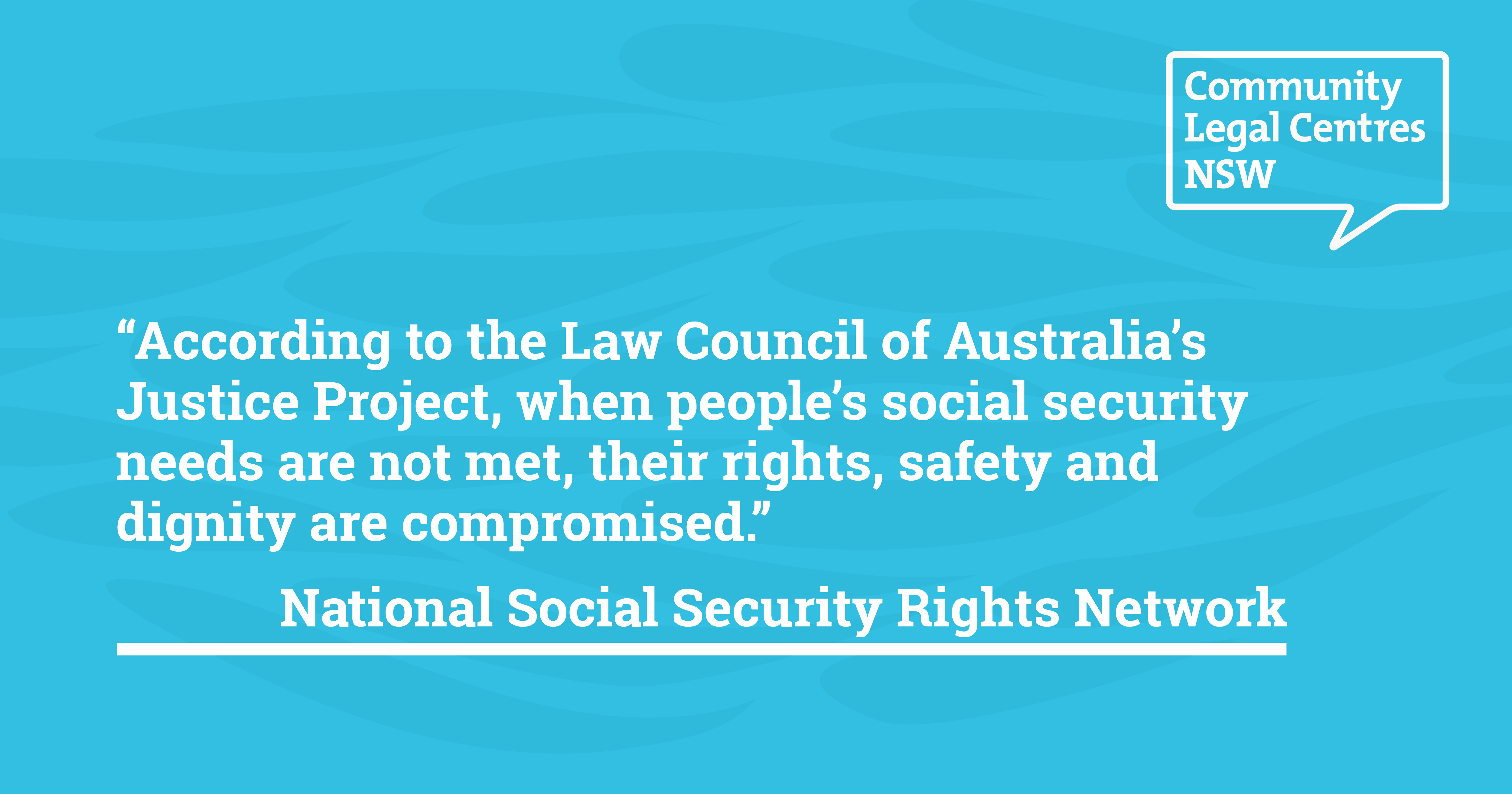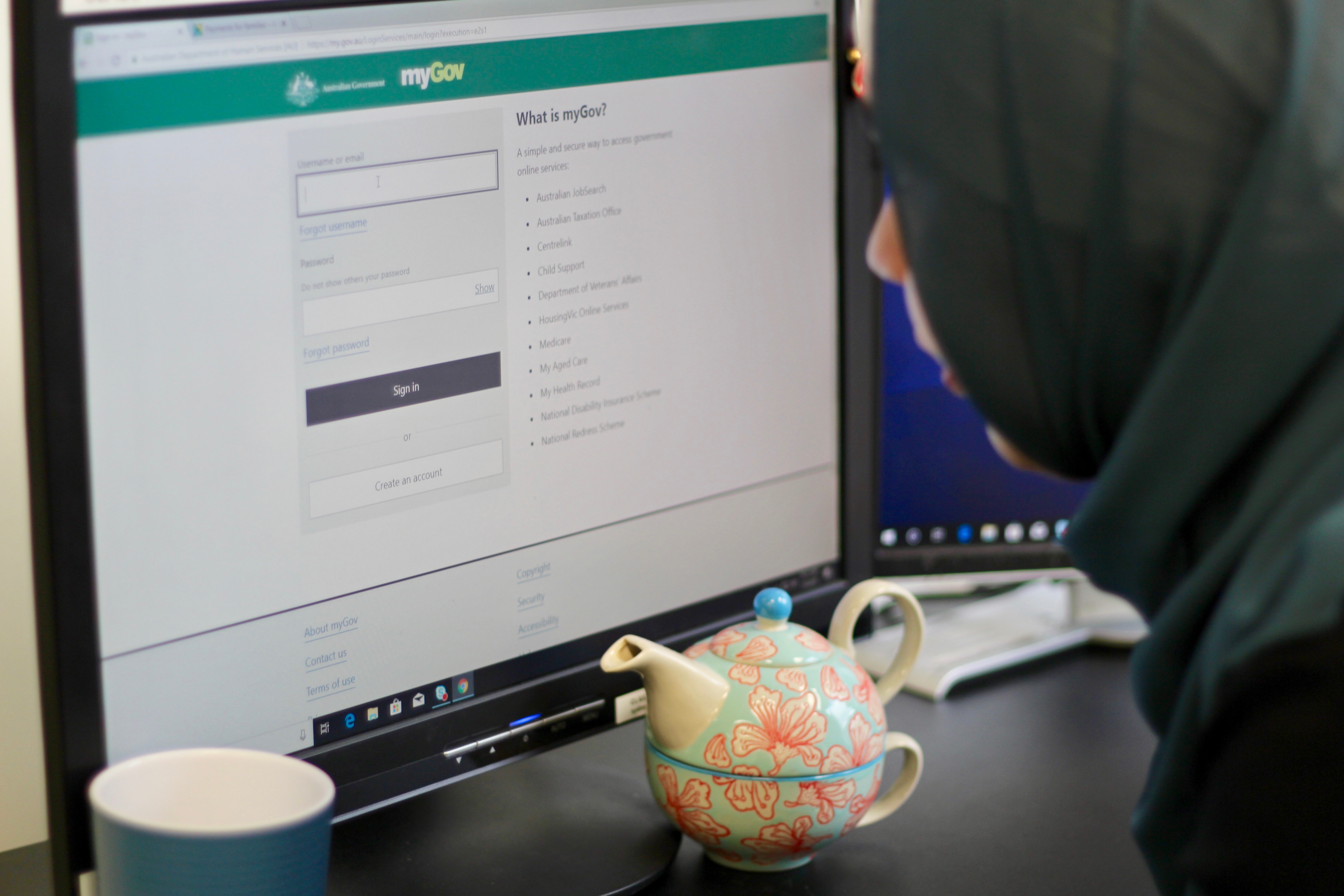Members of the National Social Security Rights Network (NSSRN) are community legal centres which provide specialist advice to people on their social security issues and rights. The NSSRN draws on its members’ expertise to inform law reform and advocacy efforts to improve social security policy and service delivery.
Social security systems play a critical role preventing people who are locked out of paid work from falling into poverty while they try to get their lives back on track. In this article, the National Social Security Rights Network reflects on the 2019-20 Federal Budget, and the impacts on people struggling to make ends meet of another missed opportunity to raise the rate of working-age social security payments in Australia.
---
 The social security system plays a critical role supporting people who are locked out of paid work or don’t have the ability or means to support themselves.
The social security system plays a critical role supporting people who are locked out of paid work or don’t have the ability or means to support themselves.
Social security problems impact people when they are at their most vulnerable. People with social security problems tend to face additional hardships like homelessness, disability, physical or mental ill-health, or family and domestic violence.[1] Yet social security problems and the laws surrounding them can be so complex that people often find themselves lost and without support.
According to the Law Council of Australia’s Justice Project,[2] when people’s social security needs are not met, their rights, safety and dignity are compromised.
Specialist social security community legal centres help people navigate the social security system, protect their rights and regain their dignity.
The 2019-20 Federal Budget held mostly bad news for people trying to survive on social security payments
One potentially positive measure announced in the 2019-20 Federal Budget is the introduction of an automated system for reporting employment income. Under the system information about a person’s employment income will go directly from their employer to the Department of Human Service via the Australian Tax Office. This has the potential to greatly reduce overpayments and social security debts. It will be important to ensure there is genuine investment in co-design and user testing of the system to make sure it works properly before it is implemented, to avoid the kind of problems we saw with Robodebt.
However, other social security budget measures continue problematic existing policies and programs.

Payments for working age people are too low
People of working age (18 – 65) who receive Newstart Allowance live on just $39 a day. This group of nearly one million Australians includes young people making the transition to work from study, single parents of school-aged children, people with a disability and older jobseekers. Rates for other working-age payments including Youth Allowance and Parenting Payment are also unacceptably low and force people into poverty.
In 2019, the Federal Government did not Raise the Rate of the Newstart Allowance, despite a growing chorus of support for an increase from the community sector, business groups, unions and prominent Australians like John Howard. This makes 2019 the 25th year in a row with no real increase to Newstart Allowance.
Instead of raising the rate, the 2019 budget introduced a one-off Energy Assistance Payment of $75 for people receiving a number of different social security payments. Initially, people receiving the Newstart Allowance were excluded, but this decision has since been reversed.
Any additional financial support to people on social security payments is welcome. However, a token, one-off payment of $75 will do little to improve the lives of people struggling on a daily basis to pay for food, housing, medicines, schooling and other bills.
Rather than spending $284.4 million over two years on a measure which will do little to help people survive, let alone transition to work, the government should immediately raise the base rate of Newstart Allowance by $75 a week.
The current employment services model is not working, and proposed changes won’t fix it
Employment services support people of working age to transition from social security payments like Newstart into paid work. Funding for these services in the 2019 Budget is less than half of the OECD average.
Further, under the current funding model, services are paid when they successfully help someone find a job and keep it. This leads to service providers prioritising ‘easy to place’ jobseekers and ‘parking’ jobseekers who need the most help finding and maintaining paid work.
As a result, the system does not provide adequate support for people who need it most.
From 1 July 2019, the government will pilot a New Employment Services Model in Adelaide and the mid-north coast of NSW. From July 2020, the pilot will be expanded to all people of working age who must meet set ‘activity requirements’ to receive their social security payment. The new model will eventually replace the current ‘jobactive’ program.
Under the new service model, ‘job-ready’ jobseekers will receive digital employment services and training. Only people identified as ‘disadvantaged jobseekers’ will receive enhanced or intensive face-to-face services.
There is widespread concern that the new model is simply a cost-cutting exercise and will not improve outcomes for people experiencing long-term unemployment.
The Government has estimated that this continued shift towards digital service provision and the associated reduction in face-to-face services will save $59.4 million over 5 years (from 2018-19). According to the Minister for Jobs and Small Business[3], these savings will be reinvested into the employment services system to provide support to those who most need it. However, in Senate Estimates on 10 April 2019, the Government confirmed that overall spending on the ‘jobactive’ program will be reduced.[4]
Access to tailored and properly resourced programs is critical to helping people transition into paid work. To be successful, employment services must have the time, expertise and resources to understand each person’s circumstances and address their particular needs. For this reason, it is critical that existing specialist employment services providers, like Disability Employment Service Providers, continue to be funded alongside generalist providers delivering services to people with complex needs.
Instead of reducing funding to already under-resourced employment services, additional resources should be invested to ensure they can achieve their purpose of supporting people experiencing long-term unemployment to return to the workforce.
 There is no evidence to support the continuation of compulsory income management
There is no evidence to support the continuation of compulsory income management
Compulsory Income Management and Cashless Debit Card trials have been widely criticised for their lack of adequate baseline evidence and their use of flawed evaluation methodology and performance indicators.
Every day, specialist social security community legal centres help people who have been disempowered and experienced financial and mental stress from being forced to participate in these trials. The exemptions to participation in the trial introduced in the Social Services Legislation Amendment (Cashless Debit Card Trial Expansion) Act 2018 clearly acknowledged that income management can negatively affect people’s mental, physical and emotional wellbeing.
Despite widespread concerns, the Government announced a 12-month extension of compulsory income management trials in the 2019 Budget. Specifically, the measure will:
- extend the Cashless Debit Card trial in existing regions (the Ceduna, East Kimberley and Goldfields regions) to 30 June 2021
- transition people participating in Compulsory Income Management schemes to the Cashless Debit Card on 1 January 2020.
The government has made some attempts to address the biggest problems with Cashless Debit Cards. These include working out how to pay interest on funds accrued in people’s accounts, improving accessibility through an increase in the number of places that accept the cards, and changing how the cards look to make it less obvious that people using them receive a social security payment.
However, these improvements are simply window dressing for a fundamentally flawed measure, which is based on the paternalistic assumption that people who receive social security payments have poor financial management skills. Despite some very public and widely criticised statements to the contrary, most of us would struggle to meet all of our expenses with just $39 a day.
Compulsory income management is perpetuating a discriminatory and misleading message that people are fully responsible for the difficult circumstances they find themselves in. In reality, in many cases systemic factors beyond people’s control affect their ability to find and keep paid work, including a lack of genuine, ongoing employment opportunities and affordable childcare, the casualisation of the workforce and discrimination.
The $128.8 million price tag for this latest extension demonstrates the high costs of delivering and administering income management. This is an unfortunate diversion of funds from measures that are demonstrably more likely to support people through difficult times in their lives. These include increasing the extremely low rates of working-age payments, ensuring employment services provide adequate supports to people who face the greatest barriers to workforce participation and improving access to healthcare, housing and education.
What needs to change
The National Social Security Rights Networks continues to call for:
- an urgent increase of $75 per week to the single rates of Newstart, Youth Allowance and related payments,
- indexation of these payments to wages and the consumer price index to ensure they maintain pace with community living standards, and the cost of housing, food, and healthcare,
- the establishment of an independent Social Security Commission to provide evidence-based advice to Parliament and review social security payment rates to ensure they continue to be set at an appropriate level, and
- the abolition of all compulsory income management schemes, including the Cashless Debit Card.
Further Reading
The National Social Security Rights Network has prepared the following factsheets on the proposed social security measures:
· Changing the Social Security Income Assessment Model,
· New Employment Services Model,
· Energy Assistance Payment, and
· Cashless Debit Card – Further extension and expansion.
To read more about the proposed Budget measures please click on the above hyperlinks which will direct you to NSSRN’s factsheets.
The National Social Security Rights Network has also provided submissions on:
· the Cashless Debit Card Bill 2019,
· ParentsNext including its trial and subsequent broader rollout,
· the review of the Social Security Commission Bill 2018.
Additional reading:
· ACOSS' Budget Priorities Statement
[1] Ibid.
[2] Law and Justice Foundation of New South Wales, Legal Need in Australia-Wide Survey (2012) 13.
[3] Minister of Jobs and Industrial Relations, ‘Budget 2019 — Significant reforms to boost Australian jobs’ (Media Release 2 April 2019) <https://ministers.jobs.gov.au/odwyer/budget-2019-significant-reforms-boost-australian-jobs>.
[4] Commonwealth, Parliamentary Debates, Education and Employment Legislation Committee, 5 April 2019, 25; Commonwealth, Parliamentary Debates, Education and Employment Legislation Committee, 10 April 2019, 6, 31.
